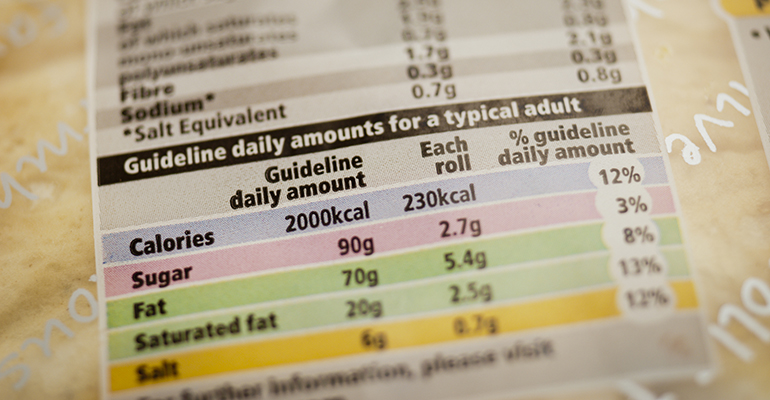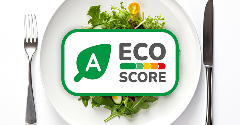News
Traffic light labels to become mandatory in UAE in under one year
1 Apr 2021Packaged food manufacturers in the United Arab Emirates (UAE) are getting ready for a front-of-pack traffic light nutrition label, which will become mandatory in January next year.
Announced by the government last year as part of its National Program for Happiness and Wellbeing, the logo is currently voluntary but will become a requirement in January 2022. The traffic light label awards packaged food and drink products a red, amber or green colour if the product contains high, medium or low amounts of four key nutrients: fat, saturated fat, sugars, and salt.

The labelling will not apply to fresh foods such as vegetables, fruit and meat, according to state news agency WAM.
The Abu Dhabi Public Health Center (ADPHC) has recently been promoting the logo on its social media page. “The traffic light food labelling system and the percentages system on the food label provide quick information on the adult's daily intake of each food item, helping to develop a healthy and balanced diet,” it said in a recent post.
“If the food label is mostly green, this means that it is low in the following nutrients (salt, sugar, fat, saturated fat) and is a good healthy option. The amber colour indicates that the product […] can be eaten in moderation. The red colour indicates that the product is high in fat, saturated fat, salt or sugar. We recommend limiting foods that contain a lot of red on the label, or, if eaten, you are advised to reduce their consumption.”
The six Arab Gulf states have very high levels of obesity and overweight. In the United Arab Emirates, around 66% of men are either overweight or obese, rising to 71% for women, according to 2016 data from a peer-reviewed study.
“We are expecting that the National Nutrition Guideline will help curb rates of chronic diseases, improve the outcomes of the national health indicators, and reduce obesity among children and adolescents as per the National Agenda 2021, said the UAE minister of health and prevention, Abdul Rahman bin Mohammed Al Owais, when announcing the measures last year.
Next year, the UAE will become one of three countries in the Eastern Mediterranean region to require mandatory traffic light labels. Iran introduced voluntary traffic light labelling in 2014 before making it mandatory in 2016. Its nutrition label advises consumers on five nutrients: energy, sugar, fat, salt, and trans fatty acids.
Saudi Arabia also made a traffic light label mandatory in 2018. It uses the UK’s thresholds for fat, saturated fat, total sugars, and salt on a 100 g or ml basis (and not per serving).
WHO: ‘A small number of countries are leading the way’
According to the World Health Organization (WHO), front-of-pack traffic light labelling enhances consumer understanding of the nutritional quality of foods compared to back-of-pack labelling and some other forms of front-of-pack nutrition label.
In a recent study published in the journal Nutrients, scientists, led by Ayoub Al-Jawaldeh from the WHO’s regional office for the Eastern Mediterranean region, wrote that policies to promote simplified, front-of-pack nutrition information could be an important element of strategies to improve population diets.
“Implementation in the Eastern Mediterranean Region has been very limited to date, although a small number of countries are now leading the way,” wrote the researchers.
“Access to simplified nutrition information is particularly important in this region, where many countries rely heavily on imported food. There is considerable scope for countries to work together and to exchange experiences, share tools and methods, and collaborate in other ways on the implementation of front-of-pack labelling. Establishment of a regional network on front-of-pack nutrition labelling could be a helpful step to facilitate such cooperation across the region.”
Related news

UK Government overhauls childhood obesity strategy
21 Nov 2025
The UK Government has announced a new package of measures designed to reverse the nation’s childhood obesity epidemic following the release of statistics revealing the scale of the crisis.
Read more
How younger consumers are redefining ingredient choices and rejecting brand loyalty
18 Nov 2025
Gen Z and millennial consumers’ preferences for transparency, functionality, and purpose are “redefining the very nature of consumption itself”, says SPINS.
Read more
New UPF standard hoped to offer consumers ‘coherence and clarity’
10 Nov 2025
Ingredients companies are being urged to enter “a new era of partnership and innovation” following the launch of the industry’s first non-UPF verification scheme.
Read more
Ingredient quantities mislabelled on popular protein bars, independent tests show
5 Nov 2025
Some popular protein bars contain more fat, carbs, and/or sugars than claimed on their labels, independent nutrition testing reveals.
Read more
Does promoting protein content push up plant-based sales?
27 Oct 2025
Promoting the protein content of meat-free products is a more effective sales strategy than adding carbon labels, a study of UK bakery chain Greggs suggests.
Read more
Supplement shoppers seek storytelling and science-backed suppliers
17 Oct 2025
Supplement consumers want specific health benefits that focus on prevention and personalisation, according to data from HealthFocus International.
Read more
Food fraud risks rise as brands fight economic and environmental headwinds
10 Oct 2025
Climate change, geopolitics, regulations, and demand for sustainable products are pushing up food fraud and adulteration risks, warns a world-leading food fraud expert.
Read more
The growing appeal of nutrient-dense food claims
2 Oct 2025
Nutrient-dense claims are rising as consumers reject the “empty calories” of UPFs in favour of products that provide meaningful nutrition with every calorie, Mintel data shows.
Read more
What does MAHA mean for the US nutraceutical industry?
30 Sep 2025
Industry associations have expressed mixed reactions to new policy directions on health and nutrition under the Make America Health Again (MAHA) banner.
Read more
Eco-Score labels improve consumer identification of sustainable foods
22 Sep 2025
The presence of a front-of-pack Eco-Score label improves consumers' accuracy in identifying sustainable food products from 52% to 72%, a study suggests.
Read more